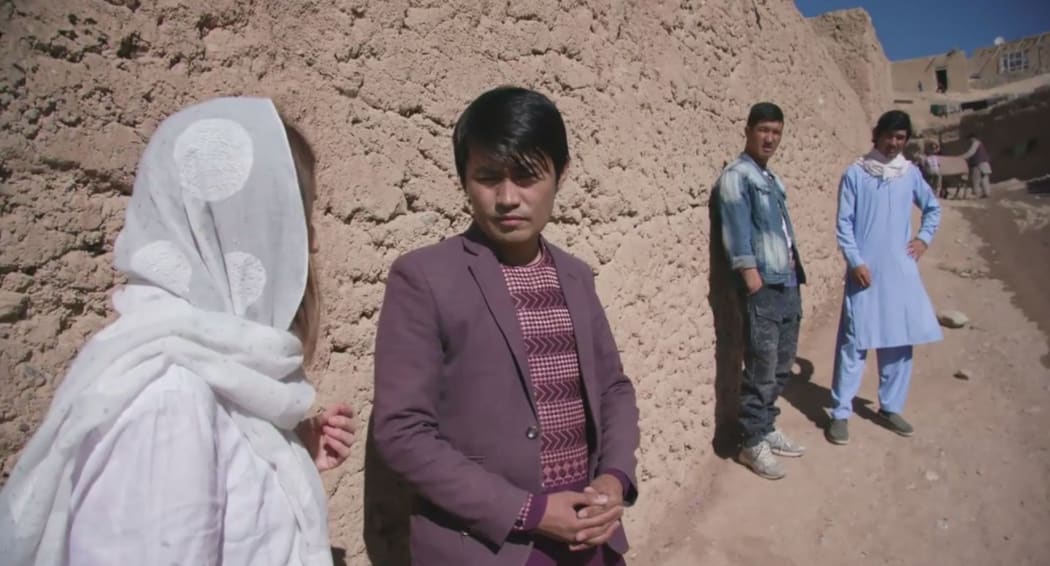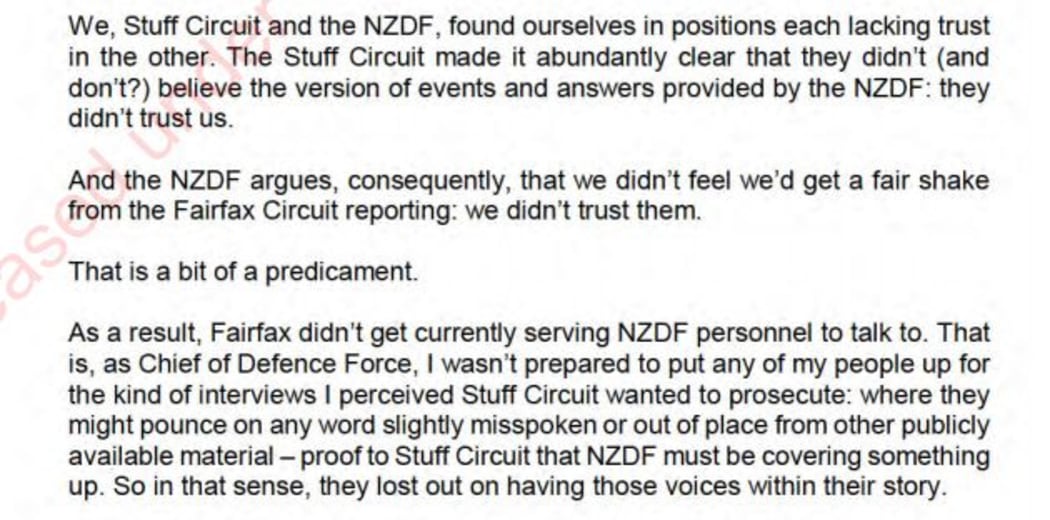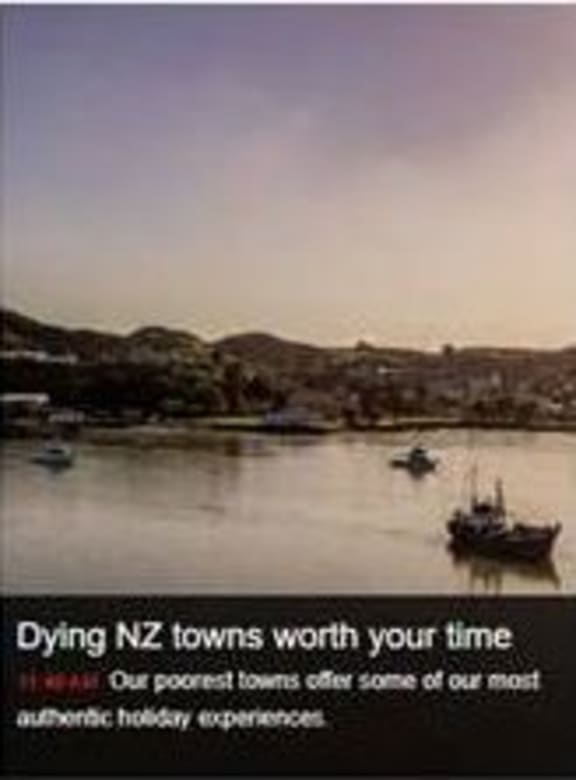Mediawatch's weekly catch-up with Lately. Colin Peacock talks to Karyn Hay about Stuff Circuit's latest headline-making investigation, big calls on our 'dying' small towns; a long-serving young MP making us feel old, and mean - and whatever happened to the old NZBC?

Paula Penfold in Stuff Circuits doco 'Life and Limb' Photo: screenshot
Afghanistan expose draws defensive response
The producers and publishers of Stuff Circuit’s latest revelations about Afghanistan - Life + Limb - worked hard to make sure it “exposed a secret the NZ Defence Force doesn’t want Kiwis to know." about what happened after New Zealand’s Provincial Reconstruction Team left Afghanistan’s Bamyan province in 2013.
The 30-minute documentary was launched on the Stuff website last Sunday and also screened on Maori TV that evening and on the Play Stuff site and smart TV app. Freeview Plus viewers may have seen it in the ‘factual’ section on their home screen.
The revelations of civilian fatalities on a firing range used by New Zealand Defence Force in Bamyian province lead Newshub at 6 and it was the front page story of Sunday Star Times, the subject of several online Stuff news stories.
Life + Limb was NZ on Air funded, so also captioned for hearing-impaired.
One blast, seven children dead. And that’s not the end of it.
— StuffCircuit (@StuffCircuit) November 16, 2019
What was left behind on NZ firing ranges in Afghanistan, and @StuffCircuit’s battle to get the truth. #LifeAndLimb
Thank you @NZonAir https://t.co/ppQLGimEfy
The Stuff papers even published a QR code readers could scan to play the video directly on their phones.

Photo: screenshot
Presenter Paula Penfold appeared on RNZ’s Sunday Morning and on The Detail (with porducer Eugene Bingham) and gave several interviews to other media on launch day or soon after.
But the story barely featured elsewhere on Sunday and Monday. TVNZ news didn’t mention it on Sunday, NZME papers and The Herald and the Otago Daily Times only carried a story about the NZDF response about sweeping the firing range in question.
How did NZDF respond?
The NZDF did not participate in Life + Limb. It only issue a statement Stuff attached to the online video’s front page.
Perhaps that’s not surprising. NZDF clashed with the Stuff Circuit team during its earlier Afghanistan project The Valley in 2017. Strategic advice released under OIA later reveals just how little trust existed between the two parties afterwards - and this is in the NZDF's official response at the time:

Photo: screenshot
The credits list Jon Stephenson as associate producer of Life + Limb. he was the co-author of the book Hit and Run which sparked an inquiry into civilian deaths in Afghanistan and also exposed evidence NZDF kept under wraps.
NZDF attempts to undermine Jon Stephenson’s reporting on NZDF conduct in Afghanistan were revealed when he sued the Defence Force chief for defamation in 2012. After three years and more than a million dollars of taxpayers’ money, NZDF settled the case eventually in 2015.
This week Hit and Run co-author Nicky Hager told RNZ:
“"What happened when the Defence Force was in Afghanistan is that they gave New Zealanders hundreds of stories they wrote themselves about all the good things they were doing, but whenever anything went wrong they had exactly the same response, which was to hide it, deny it, and hope that the news would never catch up with them - which is not what you expect from your military."
RTVNZ? NZBC 2.0? KiwiBBC?
On Mediawatch last weekend we looked at the leaked proposal to create a new public media outfit and replace TVNZ and RNZ.
Some people got in touch asking if this would be like the old NZBC in the days before 1975.
“Some will see a proposal to merge TVNZ and RNZ as a return to the good old days of the New Zealand Broadcasting Corporation (NZBC), the state monolith that ran TV and radio from 1962 until 1975. Be careful of nostalgia. They were much slower times,” warned The Press in an editorial
Some asked why radio and TV were split up in the first place.
@MediawatchNZ Talk of forgetting history re: @radionz/@TVNZ future. Does no one recall the BCNZ’s brief umbrella of media OR the mixed ad-free/commercial NZBC ?
— Andy Bell (@obelloz) November 17, 2019
(Those fluent in Welsh may enjoy his blog)
The Kirk government in 1972 formed a committee to restructure broadcasting and work out what to do about a second TV channel led by former BBC controller Kenneth Adam, which consulted the public before delivering a called The Future of Broadcasting in New Zealand in 1973.
An article in a 1983 UK book called Communication Policy in New Zealand: Overseas Influence and Local Neglect quotes Adam as saying "the committee took every opportunity to talk to drivers, chambermaids, sportsmen, receptionists and people in bars."
RNZ’s Tim Watkin unearthed a chapter by Adam in another book in which he wrote about the experience - rather lyrically
"The challenge to public radio is increasing, not diminishing. It can be a prime agent of considered change towards a more widely-informed, various, interesting and entertaining community. The face and tempoof New Zealand life are placid. There is a great emphasis on every kind of openair pursuit in the loveliest of surroundings for nine months of the year. But the beer-swilling heartiness of the Kiwi Saturday nights can be misleading. Man for man, woman for woman, the New Zealanders are among the most highly educated people in the world.
"Their interest in the arts is keen and none the worse for being largely on a ’do-it-yourself’ basis. We concluded that if the right people are put in the right places, in the belief that, in the last resort, it is people who matter more than studios, and are allowed to get on with their job uninterrupted and unfettered, broadcasting could play a sustaining and stimulating part in extending those two virtues which are already characteristic of New Zealand, tolerance and understanding."
The once-youngest MP calls it quits - making us feel old
Green MP Gareth Hughes has announced he will step down at the election next year to spend more time with his kids growing up.
He was the Greens' longest-serving MP yet when he took his seat back in February 2010, he was the youngest MP in the House by some distance.
He put his own youthfulness into context in his maiden speech.
"As the youngest member in this House I represent a generational shift both in Parliament and in the Green Party caucus. I was born in 1981 in a very different New Zealand. 28 years ago we had 3 million people and 7 million sheep; you needed a doctor’s prescription to buy margarine . . . ."
He was ruthlessly fact checked by Jeremy Rose on Mediawatch:
"That should have been 70 million sheep and no-one’s needed needed a prescription for margarine since the third Labour government scrapped that requirement in back in 1974 - and not under National in 1981."
He took it very well and even called up for a chat which made us feel a bit mean.
This week he made us feel old . . .
Dying towns? Steady on . . .

Photo: screenshot
A heading in Stuff's homepage yesterday seemed a bit on the nose:
"Dying towns worth your time: our poorest towns offer some of the most authentic holiday experiences".
"New Zealand's dying rural towns can be pretty rough places to live, with low-paying jobs - if you're lucky enough to find one - and a lack of amenities, prompting many to move elsewhere. Some of our poorest towns, however, are also some of our best places to enjoy a classic Kiwi summer break - time capsules, if you will, to the Aotearoa of yesteryear," the article began.
Condescending much? Certainly doesn't address people who live in those places (Kawhia., Murupara, Nagkawau. Patea, Waiouru) as readers.
The article links to a piece from RNZ's Susan Strongman in the Now We Are Five (Million) series which opens with this:
"While the country's rising population is due to hit 5 million next year, Kawhia, and many small rural towns like it, are dying. Susan Strongman asks why."
Susan's piece had lots of analysis and hard data on Kawhia's problems - and some towns are having similar hard times, sure, but it's a big call to definitively say we are smoothing their death pillow just yet.
A good rebuttal of this sort of thing was published three years ago in the Waikato Times:
"We get a bad rap, us small towns. We are always dying, or ageing, or getting shunted "off the grid". This week yet another round of economists all but put us in a coffin, nailed it shut, held the memorial service and then left to carry on with their lives.
"Unsurprisingly, they all live in Auckland. So I thought somebody better point out that the corpse is still breathing," wrote Cambridge resident Narelle Henson.
"I'll finish by pointing out that economists are notoriously bad at predicting the future, particularly at predicting deaths such as the claim, 30 odd years ago, that dairy was a "sunset industry." she wrote.
Journalists too?

